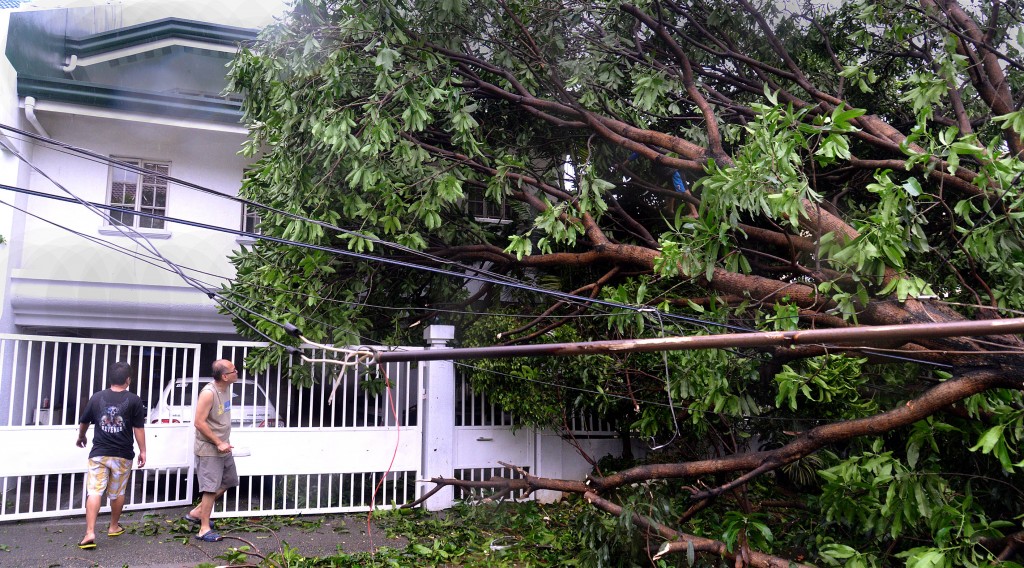6 chores to do before a storm

Residents of a Subdivision in Cainta survey the damage of his house over fallen trees and dangling Meralco wires because of the Fury of typhoon Glenda . AUGUST DELA CRUZ
Typhoon “Glenda” cut a wide swath of destruction in the country a few days ago. As an archipelago lying right on the path of most southwestern Pacific weather disturbances, the Philippines can expect at least dozens more of these typhoons to come ashore just for this rainy season alone.
Can your home take such pounding? Here are six necessary measures to take for your house to emerge still standing after the storms.
1 Start from the top. Mind your roof and gutters. “Repair leaks. Clean gutters,” says civil engineer Alexis Acacio, director of the UP Institute of Civil Engineering.
Architect Froilan L . Hong agrees. He says that chicken wire should be installed on gutters to keep falling leaves and debris out to prevent these from clogging the drains. He adds, “Repair or replace any damaged roofing sheets, shingles or flashing to prevent leaks when it rains.”
Architect Amado de Jesus, Inquirer Property Green Architrends columnist, also says, “Clean and seal your gutter and drainage systems.”
2 Keep the drains and curb inlets clear. Landscape architect Dickie Altavas stresses the necessity of cleaning out drains and curb inlets to avoid flooding. He urges homeowners to reduce, reuse, recycle and refrain from throwing trash indiscriminately to avoid clogged drains and the resulting floods and the water-borne diseases they bring.
Altavas adds: “And while at it, homeowners can gently remind trash collectors to be more careful in loading trash onto their trucks. There’s usually a trail of garbage after them.”
3 Create a swale system. De Jesus describes the swale system as “a natural way to drain rainwater through a gently sloping canal with grass to allow rainwater to be absorbed by the ground. It reduces the need for an expensive concrete drainage system.”
4 Turn trees into allies. It’s good that more homeowners are planting greens and developing green landscapes in their houses. However, architect Edilberto J. Morcilla, chair and cofounder of NEDsteel Construction and Development Corp., reminds homeowners that they should also be careful in choosing what they plant.
Morcilla explains: “One should be conscious of the kind of landscaping we are developing in our surroundings. Trees are good for the environment, but it is best to plant trees that are deeply rooted and possess pliant trunks and branches to withstand strong winds. Acacia, for one, is a nice tree for beautification but can easily be uprooted due to its shallow root system.”
He adds: “Fallen trees have been the major culprits in the widespread blackouts every time we are visited with strong typhoons. And so far, we have never learned this lesson. People are still planting the same species beside electrical posts.”
Glenda is the most recent example of an extremely strong tropical cyclone that has uprooted shallow-rooted trees, causing much of the property damage and widespread brownouts that affected over 90 percent of Metro Manila residents.
5 Ask your utility companies to help you prepare. Morcilla urges homeowners to ask their utility companies (handling power and communications) to help them prepare for the storms, especially in the pruning or trimming of trees. “The pruning of trees must be a year-round practice, and preventive rather than reactionary,” he stresses.
6 Storing is essential. Ultimately, the house serves to protect its most important occupants—the people living inside (including the pets, of course). After all possible preparations are done on the house, residents and homeowners must never forget to stock up for emergencies. “Store food and water, prepare portable propane stoves, emergency lights, battery-operated radio, batteries, blankets, and the like,” Hong reminds readers.














